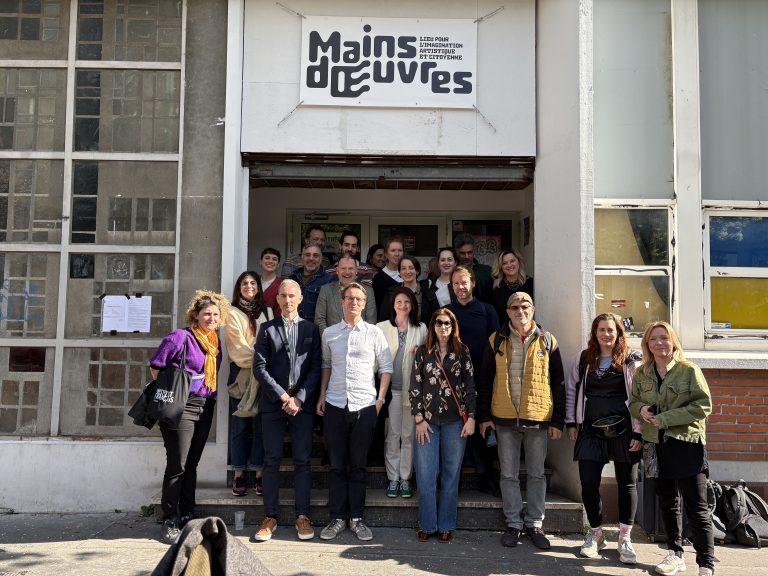Subscribe to our joint NEWSLETTER for
EUTROPIAN &
COOPERATIVE CITY MAGAZINE


Something important began in Saint-Ouen last week — and it wasn’t just the launch of a project. It was the start of a new collaboration between cultural spaces and future energy communities across Europe. Co-PED — Cultural Centres as Catalysts for Energy Communities — is a three-year European initiative that explores how social and cultural centres can become active players in the just energy transition. Rather than treating energy as a purely technical issue, Co-PED focuses on participation, place, and collective imagination.
A Network Comes Together
This project brings together 25 partner organisations across 7 countries, including 5 municipalities, 4 research partners, 6 dissemination and network partners, 5 energy partners, and 8 Urban Living Labs. Together, we aim to develop innovative models of energy governance, ownership, and community participation.
Rooted in Culture, Driven by Community
The event was hosted at Mains d’Œuvres, a fiercely independent cultural centre in Saint-Ouen that has spent over two decades defending public access to culture and collective use of space. Welcoming the group were Vincent Guimas from Green Kommon, a cultural energy fund promoting ecological transition and cooperative governance in the Plaine Commune region, and Laura Aufrère, director of La Main, Foncièrement Culturelle, a cooperative working to secure cultural venues through collective ownership. Their roles in the project embody its values: rooted, political, and community-driven.
Growing Energy from the Ground Up
The first day began in Le Jardin des Traverses, a 7,500-square-metre urban garden on a former railway line in Paris’s 18th arrondissement. More than just a site visit, it offered a glimpse into how forgotten infrastructure can be reclaimed for ecological, participatory, and cultural use. Later, participants visited Atelier 21’s test site, where Cédric Carles introduced the Paleo-Energy Project — a design-led research initiative recovering overlooked low-tech energy inventions from the past. From solar concentrators to early rechargeable battery systems, Carles presented tools that are not about nostalgia, but about rediscovering durable, collective, and accessible solutions for the future. His working prototype, the RegenBox, recharges “non-rechargeable” batteries and embodies the project’s frugal, democratic approach to innovation.
Labs for Local Energy Transformation
Back at Mains d’Œuvres, the group dove into the heart of Co-PED: the creation of eight Urban Living Labs across Europe. These labs, hosted by partner organisations, will test new models for community energy production and governance. Whether in an artist-run space in Austria, an rural energy production site in Italy, or a new urban district in the Netherlands, each lab brings together culture, community, and climate action. This wasn’t just a presentation round — it was the beginning of long-term collaboration across different contexts and conditions.
The afternoon brought a hands-on workshop led by Plaine Énergie Citoyenne, part of the Green Kommon initiative. Using a card-based simulation, participants worked through the stages of a citizen-led renewable energy project — navigating legal, financial, and community-building challenges together. The format made the process tangible, playful, and real, turning complex systems into something people could grasp, question, and shape collectively.
Cultural Centres as Energy Actors
On the third day, the group visited two cultural venues in Aubervilliers, another northern suburb of Paris known for creative experimentation. At Les Poussières, a warm and multidisciplinary cultural space, Chrystelle Prieur from the Seine-Saint-Denis Department’s Direction of Culture, Art & Territory outlined how the region is actively supporting cultural centres to become not just energy users, but energy producers — thanks in part to support mechanisms like Green Kommon.
The final visit took place at La Villa Mais d’Ici, a converted factory now home to visual artists, sculptors, street performers, and puppet-makers. There, the group encountered Les Grandes Personnes, whose towering puppets are not only an art form, but a form of community storytelling. Walking through costume shops and sound studios, participants reflected on everything they had seen: retrofitted batteries, cooperative energy games, resilient spaces, and living examples of culture as infrastructure.
What Happens Next
Over the next three years, Co-PED will unfold across eight sites in Europe, testing and documenting new models of energy governance, shared ownership, and democratic participation — all embedded in cultural practice. The goal isn’t just sustainability — it’s transformation. New alliances between artists and engineers. New ways of producing and sharing energy. New imaginaries of what a neighbourhood can be when culture and climate work hand in hand.
| Cookie | Duration | Description |
|---|---|---|
| cookielawinfo-checkbox-analytics | 11 months | This cookie is set by GDPR Cookie Consent plugin. The cookie is used to store the user consent for the cookies in the category "Analytics". |
| cookielawinfo-checkbox-functional | 11 months | The cookie is set by GDPR cookie consent to record the user consent for the cookies in the category "Functional". |
| cookielawinfo-checkbox-necessary | 11 months | This cookie is set by GDPR Cookie Consent plugin. The cookies is used to store the user consent for the cookies in the category "Necessary". |
| cookielawinfo-checkbox-others | 11 months | This cookie is set by GDPR Cookie Consent plugin. The cookie is used to store the user consent for the cookies in the category "Other. |
| cookielawinfo-checkbox-performance | 11 months | This cookie is set by GDPR Cookie Consent plugin. The cookie is used to store the user consent for the cookies in the category "Performance". |
| viewed_cookie_policy | 11 months | The cookie is set by the GDPR Cookie Consent plugin and is used to store whether or not user has consented to the use of cookies. It does not store any personal data. |
